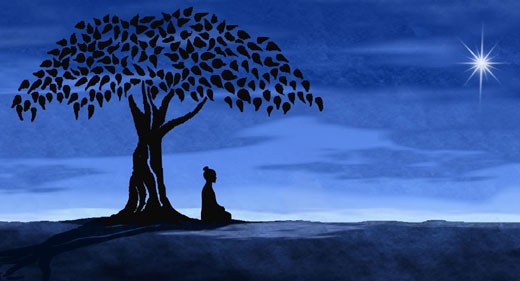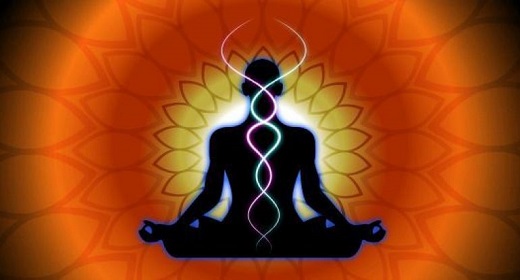Donna Quesada: So, in terms of your work with the Tibet House, which coincides with your work at Columbia University as part of the Indo-Tibetan Studies Program…

Robert Thurman Ph.D.: We have a center for Buddhist Studies at the Religion Dept. which is affiliated with Tibet House and with the American Buddhist studies there. Three organizations, but you don’t have to fuss with all of that.
DONNA: Okay. As I was saying—and I’ll just say it again, now that we are at the proper volume—it is a delight to talk with you! I thank you Robert Thurman for joining us. I think most people know you because of your long standing friendship with the Dalai Lama. I would like to go there first, if you don’t mind. I was reading about you and in preparation for this interview, I watched your Ted Talk. And I want to ask you some questions about that…but I started wondering about your own spiritual journey and how it started and how you met the Dalai Lama. You had an accident and that started a series of travels that brought you to India. Is that right? Would you mind sharing that with us?
BOB: Not at all…that precipitated me deciding that my hobby or my spiritual quest was more important than my Harvard education. So, I went to India. Not necessarily to see the Dalai Lama—I didn’t know yet who he was. But I knew there would be some Yoga…spiritual Yoga of the mind and body. But particularly of the mind and emotions—that would be more helpful than western psychology and philosophy as far as I understood it at that time…1962…1961. So, I went to India as a pilgrim. It took me almost a year to get there, hitch-hiking, walking, etc. And then, when I met the Tibetans, I realized the Tibetans had the knowledge that I wanted, which was a preserving of the ancient Indian Buddhist knowledge. It was lost in India because it was wiped out by foreign invasions about 1,000 years ago.
And then I took a job. I was going to teach Tibetans. I heard the Dalai Lama give a talk but didn’t really meet him…in Delhi. Then my father passed away. I came back here, just for the funeral. And when I was here, I met him in New Jersey, oddly enough—an hour away from where I grew up in Manhattan…a Mongolian monk, who had been 35 years in Tibet…and had two Tibetan degrees, Lama degrees! And he and I had this karma…I couldn’t go a step past him. And he became my teacher and I learned the language and I learned about Buddhism from him. And I had some sort of transformative relief by way of meditative experiences.
But then I was bugging him to be a monk…because I wanted to be a Buddhist Monk for life. That is all I wanted in life. And he said, “your karma is not to be a monk, formally...you are being a monk, informally, and that’s fine, but eventually it’s not your karma, so don’t rush into the ceremonial formality of it…because I’m telling you, you are not going to be that for life.” But I wouldn’t listen. I was 20, 21 years old. So, after a couple of years, he took me back to India himself. And he introduced me to the Dalai Lama. And the Dalai Lama took me under his wing. And then he did make me a monk. But then, I only lasted another year and a half as a formal monk. And the old Lama’s prediction turned out true.
I was called—this was the middle of the 60’s Civil Rights Movement…protests of the war. A whole psychological change of the United States’ younger generation. Indeed, I had a role that it wasn’t possible to do as a Buddhist Monk. And there was no real Buddhist monastic community to take care of me, either. There was just a little temple my teacher had in New Jersey. So, then I resigned as a monk. That was a little bit of a shock to the Dalai Lama, at first. But then I went back about two or three years later as a graduate student at Harvard…because I went back to Harvard…with a wife and two children, by then.
One of the reasons that the Dalai Lama and his teachers, who had been my teachers during the couple of years that I was there…they loved my children so much…and my wife…and they figured she’d keep me going straight…so, they forgave me, kinda…as a lay person. I was kind of ordained as a lay person. So, since then, I’ve been a house-holder friend…on and off for 50 years…53 years…54 years now. And I have been ordered by His Holiness, who has promised to live ‘till 113, if necessary, to straighten out the situation for his people. But, he would rather not. He would rather change bodies to a new, younger one…sooner. But he would or could do it ‘till then. And then he ordered me to stay that long, as well. Since I’m six years younger, that means 107. Again, I have no intention or wish to do that! I’d much rather be reborn in some other way. The body gets so creaky! The cheapest and most effective way to be rejuvenated is to be reborn…with a nice mom and dad…in a good neighborhood.
DONNA: …in a nice new vehicle.
BOB: …where you can practice the dharma more. And cultivate your journey to Buddhahood more effectively. But I guess I’ll have to try and stay as long as he had to try and stay. And in a way, the persistence of a silly policy by the Chinese government…which is not the Chinese people—who actually like the Dalai Lama a great deal—But the Chinese government, acting like he is a bad guy or something. When everyone in the world knows he is a really nice guy. We hope that will change before I am 107.
DONNA: Well, it’s funny that you should say that. I’ve shared with you the course that I teach and I have a lot of immigrant students. And I would like to get your two cents on this. I’ve noticed that a lot of the younger Chinese generation doesn’t have access to the whole story. They are not being told who the Dalai Lama really is. You know, it’s a very manipulative thing. And I know it’s a controversial thing to go into, but I think it benefits all of us to have the story straight. They are being told he is a bad guy. And I was wondering, what else do you have to say about that and how can we address that when it’s so firmly entrenched in their minds?… That he is bad and that Tibet is not autonomous and that it’s a political situation? It becomes very, very heated, very quickly.
BOB: Oh yeah, of course. You see, they do live in a police state. Which America is sort of heading towards, slightly. But we’re not there yet. Thank Goodness! But they do live in such a police state and therefore, they are only given certain types of information. And not only that, but if they maintain certain views, they are jeopardized…their career and activity. They are also encouraged to observe each other. So, they have to be more and more gung-ho with the party line…whatever it is. And it may not be exactly what they think, in fact. They can’t show what they think, freely…students, for example, who are there. You said “immigrant,” but I’m not sure if they are just visitors on student visa or what they are. But the Chinese consulate keeps very strong track ever since Tiananman Square, on any young people that they have been allowed to send to the west. So, they are aware that whatever they say, someone else is listening to them. They have to say the party line. So, you can’t really tell exactly what they think. Like, if you went to China today and you asked somebody…somebody would be minding you and people would say what ever they think the government wants you to hear. Because in fact, underground, even communist party officials love Tibetan Lamas. I didn’t see this program, but you know those programs where there is usually some kind of Brit-type who is the monitor of the program?
DONNA: The narrator.
BOB: It’s the rich and famous. High lifestyles of the rich and famous. They run into some Chinese billionaire types. And then these billionaires proudly say they have a Tibetan Lama on the top floor of their mansion. “I’m doing rituals and I’m meditating.” The Tibetan thing is a big mystique in China, in the popular mind—just like in the West…Shangri-La. Fantasy. It’s not really the real thing but they have that. And Buddhism is very strong in a lot of communist party members, themselves. Quietly, they have a Lama. They go to Tibet to see some teacher or they have one in Shanghai who teaches them. And it’s quite a bit of something.
DONNA: interesting.
BOB: So that’s one point. And then the second point is, you know…it’s just a matter of them facing reality eventually. And Chinese people are very intelligent, very creative. They are not going to be brain washed forever. And they will wake up to the situation, we’re confident, in not such a very long time. Furthermore, the policy of the leadership and particularly Xi Jinping…we actually like. Although, many people, Scientologists, and what not, are afraid of him because he’s like the new Mao because he is so popular. But actually, his father was a close friend of the Dalai Lama when the Dalai Lama was 19 years of age. And the family has a special connection with Buddhism. And we expect him…when he has sufficient power to maybe change a foolish policy…because they can tell people he is a bad guy but the world really likes the Dalai Lama. He’ll be right up there with The Pope and Angelina Jolie and a few other people in the top most popular people…Nelson Mandela when he was still alive…Tutu…there in popularity world wide, but the Chinese people don’t know that, so they think they are going to get some mileage, some traction by convincing everybody that the Dalai Lama is a wolf in sheep’s clothing. But it kind of actually makes them look silly. Huge economy…running around attacking a man who has no country, no army, no PR firm…and chasing him, trying to get people to think he’s a bad guy. It’s kind of silly.
DONNA: Yeah.
BOB: And on the contrary…if they took him at his word that he’s not seeking to split from China…he can’t repeat the lie that Tibet was always controlled by China. They aren’t Chinese. That’s not true. They are not. It’s like the Lakota Indians—they’re not actually like Euro-Americans. Now, that’s a fact here in America. So, he can’t do that, but he has said…and he constantly repeats to them since the 70‘s…that “Okay, we are defacto part of China…we’ll be part of China…we would just like local autonomy, as promised, to us so-called ‘minorities’ in the Chinese constitution. So, you can’t come in and destroy our monasteries…destroy our Buddhism with Marxism. We don’t mind being Marxist in our government, but we like to have our Buddhism.”
So, it’s actually a very moderate thing. He’s not going to ask to split off from China as they always insist. The leadership in China knows that he is sincere, but they pretend they don’t. Believe me, they don’t want to go dialogue because once people have dialogue and he’s openly not opposed by them and he talks with them…everybody will investigate the Tibetan situation, including their own people. And then they will realize that they did invade it in 1950. They have been doing cultural genocide there. And their thought reform and their anti-religion thing…like us, Americans, we admit we genocide the Native People. But certain people who still want to have The Cleveland Indians or The Washington Redskins…they kind of don’t want to really face it.
DONNA: Right.
BOB: They want to be in denial about it. But most people are open to the fact. And even in text books, in schools now…Oh gee, there were Americans that were here before… We say, “Native Americans,” but our energy companies, like at Standing Rock, are still persecuting them, actually.
DONNA: It is an interesting parallel. It makes me wonder…I want to kind of bring us…since we are talking politics…we are in such a turbulent political time…and I know you have written about how Buddhism can be of practical use. And I get that a lot, too. We have these ancient teachings which are so valuable. How do you address that, when people say “how can such an old teaching…how can a mystical teacher be relevant to our times today…when we are self-destructing environmentally, politically, and we have so many issues?”
BOB: Well, because he is a teacher. He’s very clear that a lot of our electors in America or Europe…it is not already a Buddhist country…a formally Buddhist audience. He is very clear that at this time in history, that a so called “world religion” should not be trying to convert each other’s adherents. So, he tells young people, “stay within the religious framework of your grandmother…otherwise your grandmother will be upset. If you want to learn something from Buddhism about meditating…about mindfulness…how to cultivate your positive emotions…restrain your negative anger…hatred…jealousy…pride…egotism..narcissism, etc…if you want to learn something, use it…use it as a Christian…use it as a Jew…use it as a Muslim.” Or, he actually considers secular humanism as a global religious movement, to be respected.
DONNA: He’s practical. He doesn’t want people to rock the boat. He feels they will be more effective that way…if they stay within their channels, so to speak.
BOB: And his service within the socio-political realm is that another thing we need to stop doing in this world is using war as a way of making decisions. We have to dialogue with people, even enemies. We have to talk to them. We have to come to a thing…no killing…no war is like a base line. And sometimes, we have to defend ourselves, of course. But as a base line, no aggressive killing, no aggressive pre-emptive invasions. It’s counter-productive. And he notes that, along with other thinkers. No one has won any wars lately. Because of the nature of the weaponry, the nature of the information. You can’t go out and say, “Ukrainians are a lower species than Russians, therefore we should get all the Ukrainians, then enjoy it as a province of Russia.” We can’t do that, either, with Mexicans, or to some other people. Because everybody knows that everybody else is a human being now. And also, weapons are too powerful, so no one can win a war anymore. The winners will lose because the weapons are so powerful.
There is a wonderful book by Jonathan Schell called Unconquerable World…On War, by Von Clausewitz, the Prussian theorist of war…that what a lot of modern people are working by is no longer operative. Because you cannot get another country to do what you want by making war on them. Because in fact, what you do is that you destroy that country. And what’s left is some terrorists that are really mad that you killed their grandmother.
DONNA: And so, the backlash is bigger than it even would have been.
Read and Watch Part II Here: Awaken Interviews Robert Thurman PhD Pt 2 – World Peace Through Inner Peace
Read and Watch Part III Here: Awaken Interviews Robert Thurman PhD Pt 3 – Be Lucid Waking


















































